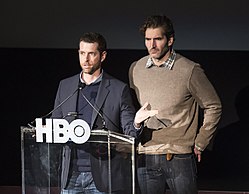Critical response
The episode was well received by critics. Review aggregator Rotten Tomatoes surveyed 20 reviews of the episode and judged 100% of them to be positive with an average score of 9.02 out of 10. The website's critical consensus reads, "The cinematic, fast-paced "You Win or You Die" thrusts the plot forward while hinting at painful moments looming for fans." [11] Time 's reviewer James Poniewozik called "You Win or You Die" the "most thrilling and thematically rich hour to date," [12] AOL TV's Maureen Ryan found it an excellent outing that "saw the stakes raised in satisfying and suspenseful ways," [13] and HitFix's Alan Sepinwall called it a terrific episode and commended how "it turned the spotlight on the characters who are villains in Ned Stark's version of the story." [14]
"The titular game of thrones (which gets namechecked in the line from Cersei that also provides the individual episode name) has moved past the opening gambit stage now. Major players are falling, alliances are being made and broken, and based on what we know is happening in the north with the White Walkers and to the east with the Dothraki, the game is bound to get a lot bloodier in a damn hurry. These people don't have time to be stressing about who sits on the Iron Throne, not when giant zombies and/or relentless master warriors are on their way."
— Alan Sepinwall, HitFix [14] Poniewozik continued: "We knew this would be a significant episode if for no other reason than that it contains the scene—alluded to in the episode's title—that gives the series its name," [12] a sentiment Sepinwall agreed with. Myles McNutt, writing for Cultural Learnings, also considered "You Win or You Die" a climactic moment in the series. [15] IGN 's Matt Fowler noted that this was the episode that saw Ned Stark "unfortunately thwarted by his own honorable intentions," but that his "stubborn nobility is what makes Ned such a great character." [16]
The final showdown with the Lannisters seizing control from Eddard was much discussed, with many commentators criticizing Ned's ingenuity and his actions during the episode. In The Atlantic , Scott Meslow wrote that Eddard could never win the "game of thrones" because he is dedicated to playing by the rules. In his opinion, "one can't afford to play fair" when the only outcomes are "win" or "die." [17] McNutt felt that the climax at the episode's end "was really well handled by both the cast and the director (Dan Minahan)." [15]
As well as the final confrontation between Eddard and Cersei, other scenes were praised by the critics. The introduction of Charles Dance as Lord Tywin Lannister was considered "a beauty" by Emily VanDerWerff from the A.V. Club , who admired how a single scene depicted not only the relationship between Tywin and Jaime, but also all the dynamics of the Lannister clan. She also praised the work of Nikolaj Coster-Waldau in the scene, commenting that despite having few lines, he transmitted that Jaime is cowed by his father very well. [4] Maureen Ryan agreed with that sentiment, and also lauded Natalia Tena's short appearance. [13] David Sims (a second reviewer for the A.V. Club) highlighted the work of Mark Addy in his final scene, extending the praise to the rest of his work on the series. [18]
Critics agreed that the scenes with the Dothraki were strong, with the storyline having improved significantly since the first episodes. Poniewozik stated that "this was the first week for me that the Dothraki scenes were not just absorbing but felt like the characters were as well-imagined as those in Westeros," [12] and McNutt felt the episode "finally allows Khal Drogo to become an actual character." [15] Drogo's rant vowing to give his unborn son the Iron Throne led to compliments about Jason Momoa's intensity and Emilia Clarke's calm and loving facial expressions. [4] [13]
However, the scene where Littlefinger exposes his motivations while hiring two whores for his brothel was largely criticized as an example of the show's perceived abuse of conversations with prostitutes as an expository device, a situation for which Myles McNutt coined the term "sexposition." [15] Aidan Gillen's acting was consistently praised and the comparison between Littlefinger's actions and faking an orgasm was considered apt, but many agreed with Meslow's statement that it was "annoyingly overshadowed by the series' most gratuitous sex scene to date." [17] Among other criticisms were the scene's excessive length, the repetition of the dramatic approach, and the assumption that viewers were not going to pay attention when presented with a long exposition that did not include sex. [12] [18]
